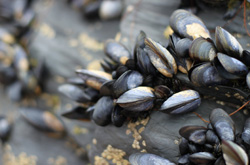Mimicking marine organisms to design novel materials
Synthesis of biomimetic materials, inspired by various biological systems, constitutes a popular research field with great applicability. In line with this, the project ‘Reinforcing capacity towards industrially relevant research on bio-inspired materials and delivery mechanisms’ (Blue4glue) is studying bio-adhesives used by marine organisms and which have the ability to work in the presence of water. The EU-funded Blue4glue project is a partnership between two European academic institutions and Procter and Gamble (P&G) technical centres. The plan is to either develop bio-adhesive compounds with synthetic methods or extract them from natural marine organisms for utilisation in various consumer products. Partners have followed the Fmoc solid phase peptide synthesis (SPPS) technique to synthesise peptides with repeating sequences modified with Dopa amino-acids to create a strong bond with various surfaces. These peptides mimic the efficient adhesive mechanisms of the substrates of marine organisms that resist under water. They are subsequently being connected to polyvinyl chloride (PVC), PEG and silicon polymers and the resulting biopolymers are tested for their interaction with hard surfaces. The biopolymer synthesis is being optimised and the adsorption onto surfaces is being monitored using the optical method of ellipsometry. Several model biopolymers have been tested for their ability to adhere to any surface and act as deposition aid for home and healthcare products. Polymers with adhesive release properties have also been generated for production of anti-sticking films. Blue4glue deliverables to date demonstrate the applicability of basic scientific knowledge for development of industrial products. The synthesised biopolymers have the potential to meet the challenges of a fast moving world of consumer products and improve on existing technologies.



